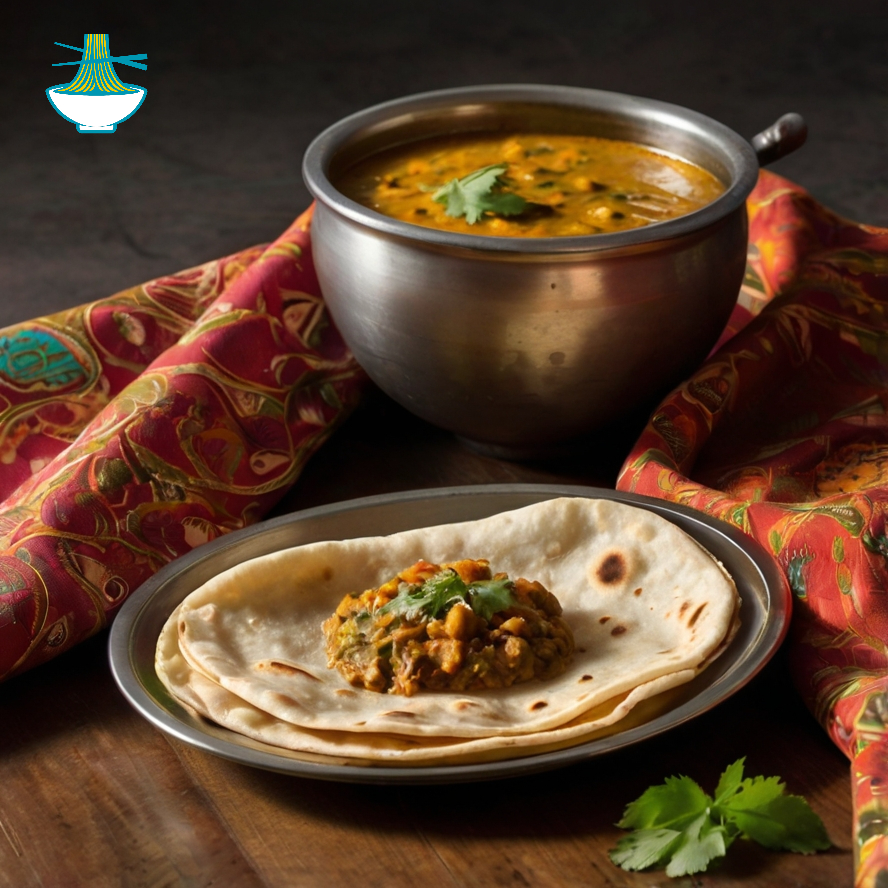Experience the rich flavors of Kenya with our unique dish that combines soft, flaky chapati bread with creamy, coconut-infused maharagwe. Enjoy the perfect blend of textures and tastes in every bite, a culinary journey to East Africa on your plate.
Here's a recipe for Kenya Chapati with Maharagwe:
Ingredients:
Chapati Ingredients:
- 2 cups all-purpose flour
- 1 teaspoon salt
- Water, as needed
- 2 tablespoons vegetable oil
Maharagwe Ingredients:
- 1 cup dried red kidney beans, soaked overnight
- 1 onion, finely chopped
- 2 tomatoes, chopped
- 1 tablespoon tomato paste
- 1 cup coconut milk
- 2 tablespoons vegetable oil
- 1 teaspoon curry powder
- Salt and pepper, to taste
- Fresh cilantro, chopped (optional)
Instructions:
1. Chapati:
1- In a large bowl, mix the flour and salt. Gradually add water and knead until you have a smooth dough.
2- Divide the dough into small balls, about the size of a golf ball. Roll out each ball into a thin circle.
3- Heat a skillet over medium heat and brush with a little oil. Cook each chapati for about 1-2 minutes on each side, until lightly browned and cooked through. Set aside.
2. Maharagwe:
1- In a large pot, heat the vegetable oil over medium heat. Add the chopped onion and cook until soft and translucent.
2- Add the chopped tomatoes and cook until they start to break down.
3- Stir in the tomato paste, curry powder, salt, and pepper. Cook for another minute.
4- Add the soaked kidney beans and enough water to cover them. Bring to a boil, then reduce the heat and simmer for about 1-2 hours, or until the beans are tender.
5- Stir in the coconut milk and simmer for another 10-15 minutes.
6- Serve the chapati with the maharagwe, garnished with fresh cilantro if desired. Enjoy!
Nutritional Values:
Here are approximate nutritional values for the ingredients used in the Kenya Chapati with Maharagwe recipe, per serving:
Chapati Ingredients:
2 Cups All-Purpose Flour:
- Calories: 910 kcal
- Fat: 2.4 g
- Carbohydrates: 190 g
- Protein: 24 g
Benefits: All-purpose flour provides carbohydrates for energy. Although it has less fiber than whole wheat flour, it is versatile and used in various baked goods and flatbreads, contributing to a balanced diet.
1 Teaspoon Salt:
- Calories: Negligible
- Fat: 0 g
- Carbohydrates: 0 g
- Protein: 0 g
Benefits: Salt enhances flavor and seasoning. It is essential for maintaining electrolyte balance but should be used in moderation to avoid excessive sodium intake.
Water, as Needed:
- Calories: 0 kcal
- Fat: 0 g
- Carbohydrates: 0 g
- Protein: 0 g
Benefits: Water hydrates the flour to form a dough. It is essential for various bodily functions and maintaining hydration.
2 Tablespoons Vegetable Oil:
- Calories: 240 kcal
- Fat: 27 g
- Carbohydrates: 0 g
- Protein: 0 g
Benefits: Provides essential fatty acids and helps in the absorption of fat-soluble vitamins. It also adds moisture to the chapati, making it soft and pliable.
Maharagwe Ingredients:
1 Cup Dried Red Kidney Beans, Soaked Overnight:
- Calories: 620 kcal (cooked)
- Fat: 2 g
- Carbohydrates: 112 g
- Protein: 43 g
Benefits: Rich in protein, fiber, and complex carbohydrates. An excellent source of plant-based protein, iron, potassium, and folate, supporting digestive health, stabilizing blood sugar, and providing sustained energy.
1 Onion, Finely Chopped:
- Calories: 45 kcal
- Fat: 0 g
- Carbohydrates: 11 g
- Protein: 1 g
Benefits: Onions are rich in antioxidants and compounds that support heart health, reduce inflammation, and may help regulate blood sugar levels. They add flavor and depth to the dish.
2 Tomatoes, Chopped:
- Calories: 44 kcal
- Fat: 0 g
- Carbohydrates: 10 g
- Protein: 2 g
Benefits: Tomatoes are an excellent source of vitamin C, potassium, folate, and lycopene, a powerful antioxidant that supports heart health and may reduce the risk of certain cancers. They add acidity and sweetness to the dish.
1 Tablespoon Tomato Paste:
- Calories: 15 kcal
- Fat: 0 g
- Carbohydrates: 3 g
- Protein: 0.5 g
Benefits: Concentrated in flavor and nutrients, tomato paste provides a rich source of lycopene and adds a deep, savory taste to the dish.
1 Cup Coconut Milk:
- Calories: 445 kcal
- Fat: 48 g
- Carbohydrates: 6 g
- Protein: 4 g
Benefits: Rich in healthy fats, particularly medium-chain triglycerides (MCTs), which are easily metabolized by the body for energy. It adds creaminess to the dish and provides a mild coconut flavor.
2 Tablespoons Vegetable Oil:
- Calories: 240 kcal
- Fat: 27 g
- Carbohydrates: 0 g
- Protein: 0 g
Benefits: Provides essential fatty acids and helps in the absorption of fat-soluble vitamins. Used in sautéing, it helps in bringing out the flavors of the ingredients.
1 Teaspoon Curry Powder:
- Calories: 6 kcal
- Fat: 0.3 g
- Carbohydrates: 1.1 g
- Protein: 0.2 g
Benefits: A blend of spices like turmeric, coriander, cumin, and chili, curry powder has antioxidant, anti-inflammatory, and digestive benefits. It adds a warm, complex flavor to the dish.
Salt and Pepper, to Taste:
- Calories: Negligible
- Fat: 0 g
- Carbohydrates: 0 g
- Protein: 0 g
Benefits: Enhances the flavor and seasoning of the dish. Black pepper contains antioxidants and may aid digestion.
Fresh Cilantro, Chopped (Optional):
- Calories: 1 kcal
- Fat: 0 g
- Carbohydrates: 0.2 g
- Protein: 0.1 g
Benefits: Rich in vitamins A, C, and K, cilantro has antioxidant properties. It can aid digestion, reduce inflammation, and add a fresh, herbaceous flavor to the dish.
Please note that these values are approximate and can vary based on specific ingredients and portion sizes.


Comments